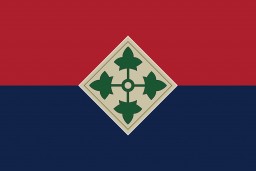You searched for: used交易程序後臺源碼【tg���������@ek7676】平台包网搭建usd交易程序後臺源碼【tg���������@ek7676】平台包网搭建ivkcss1pgu
<< Previous | Displaying results 61-70 of 1781 for "used交易程序後臺源碼【tg���������@ek7676】平台包网搭建usd交易程序後臺源碼【tg���������@ek7676】平台包网搭建ivkcss1pgu" | Next >>
-
Flag graphic for US 104th Infantry Division
PhotoA digital representation of the United States 104th Infantry Division's flag. The US 104th Infantry Division (the "Timberwolf" division) was activated in 1942. During World War II, they captured the cities of Cologne and Halle. The division also overran Nordhausen and the Dora-Mittelbau concentration camp. The 104th Infantry Division was recognized as a liberating unit in 1988 by the United States Army Center of Military History and the United States Holocaust Memorial Museum (USHMM).

-
Flag graphic for US 10th Armored Division
PhotoA digital representation of the United States 10th Armored Division's flag. The US 10th Armored Division is also known as the "Tiger" division. During World War II, they captured the cities of Trier and Oberammergau. The division also overran a Dachau subcamp. The 10th Armored Division was recognized as a liberating unit in 1985 by the United States Army Center of Military History and the United States Holocaust Memorial Museum (USHMM).

-
Flag graphic for US 11th Armored Division
PhotoA digital representation of the United States 11th Armored Division's flag. The US 11th Armored Division (the "Thunderbolt" division) was formed in 1942. During World War II, they were involved in the Battle of the Bulge and captured the cities of Coburg, Bayreuth, and Linz. The division also overran the Mauthausen and Gusen concentration camps. The 11th Armored Division was recognized as a liberating unit in 1985 by the United States Army Center of Military History and the United States Holocaust…

-
Flag graphic for US 12th Armored Division
PhotoA digital representation of the United States 12th Armored Division's flag. The US 12th Armored Divison is also known as the "Hellcats" division. During World War II, they captured the cities of Ludwigshafen and Würzburg. The division also overran a subcamp of Dachau. The 12th Armored Division was recognized as a liberating unit in 1988 by the United States Army Center of Military History and the United States Holocaust Memorial Museum (USHMM).

-
Flag graphic for US 29th Infantry Division
PhotoA digital representation of the United States 29th Infantry Division's flag. The US 29th Infantry Division (the "Blue and Gray" division) was established in 1917 and fought in World War I. During World War II, they were involved in D-Day, as well as the liberation of Dinslaken civilian labor camp. The 29th Infantry Division was recognized as a liberating unit in 1995 by the United States Army Center of Military History and the United States Holocaust Memorial Museum (USHMM).

-
Flag graphic for US 30th Infantry Division
PhotoA digital representation of the United States 30th Infantry Division's flag. The US 30th Infantry Division (the "Old Hickory" division) was established in 1917 and fought in World War I. During World War II, they were involved in the Battle of the Bulge and also liberated Weferlingen, a subcamp of Buchenwald. The 30th Infantry Division was recognized as a liberating unit in 2012 by the United States Army Center of Military History and the United States Holocaust Memorial Museum (USHMM).

-
Flag graphic for US 3rd Armored Division
PhotoA digital representation of the United States 3rd Armored Division's flag. The US 3rd Armored Division (the "Spearhead" division) was established in 1941. During World War II, they were involved in the Battle of the Bulge and captured the city of Cologne. The division also discovered the Dora-Mittelbau concentration camp. The 3rd Armored Division was recognized as a liberating unit in 1985 by the United States Army Center of Military History and the United States Holocaust Memorial Museum (USHMM).

-
Flag graphic for US 4th Infantry Division
PhotoA digital representation of the United States 4th Infantry Division's flag. The US 4th Infantry Division (the "Ivy" division) was established in 1917 and fought in World War I. During World War II, they were involved in D-Day, the liberation of Paris, and the Battle of the Bulge. The division also captured the city of Nuremberg and discovered a Dachau subcamp near Haunstetten. The 4th Infantry Division was recognized as a liberating unit in 1992 by the United States Army Center of Military History and…

-
Flag graphic for US 65th Infantry Division
PhotoA digital representation of the United States 65th Infantry Division's flag. The US 65th Infantry Division (the "Battle Axe" division) was established in 1943. During World War II, they took the cities of Regensburg, Passau, and Linz. The division also overran a subcamp of the Flossenbürg concentration camp. The 65th Infantry Division was recognized as a liberating unit in 1994 by the United States Army Center of Military History and the United States Holocaust Memorial Museum (USHMM).

-
Flag graphic for US 69th Infantry Division
PhotoA digital representation of the United States 69th Infantry Division's flag. The US 69th Infantry Division ("Fighting 69th") was established in 1943. During World War II, they captured the city of Leipzig and uncovered Leipzig-Thekla, a subcamp of Buchenwald. The 69th Infantry Division was recognized as a liberating unit in 1993 by the United States Army Center of Military History and the United States Holocaust Memorial Museum (USHMM).

